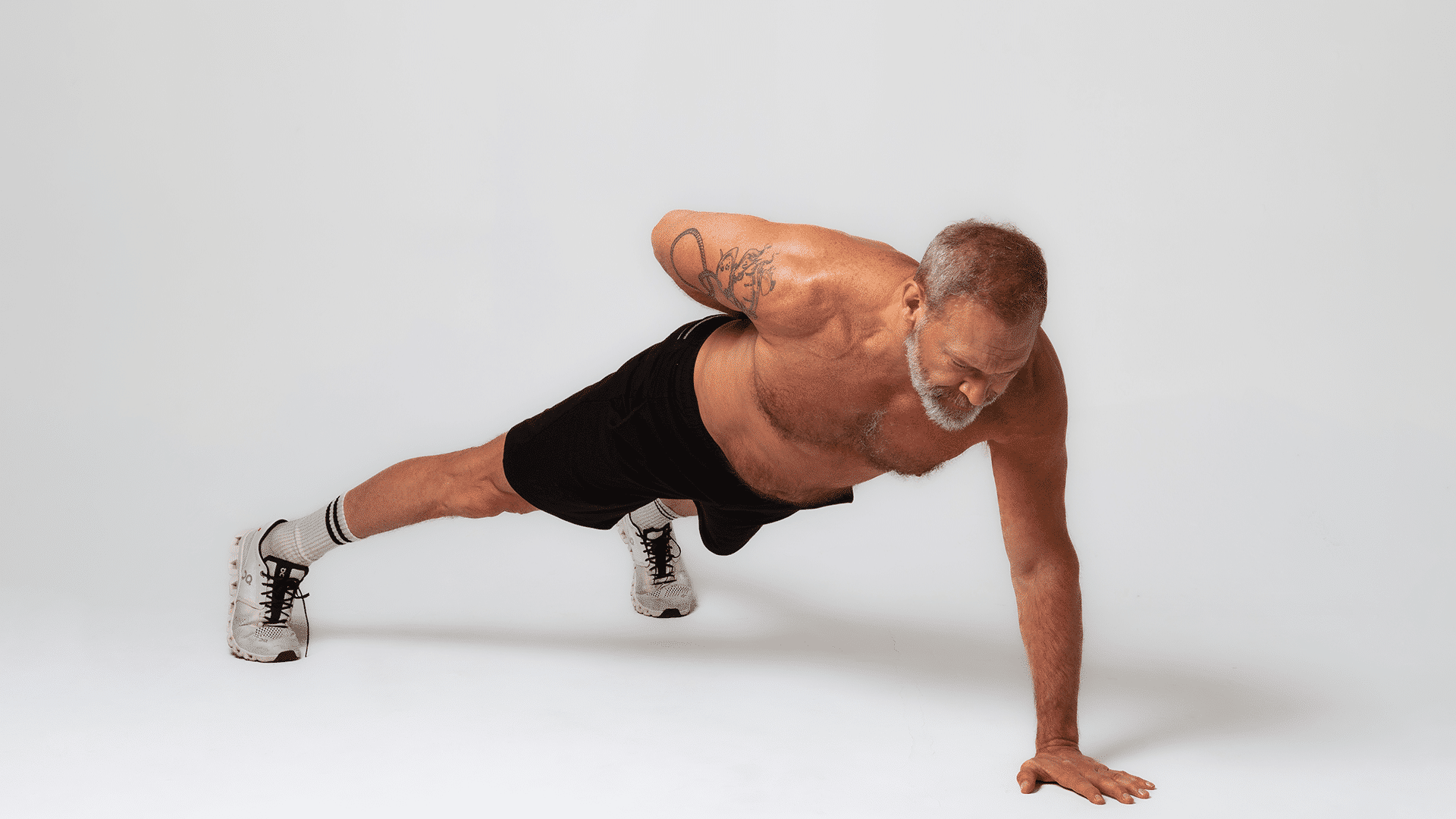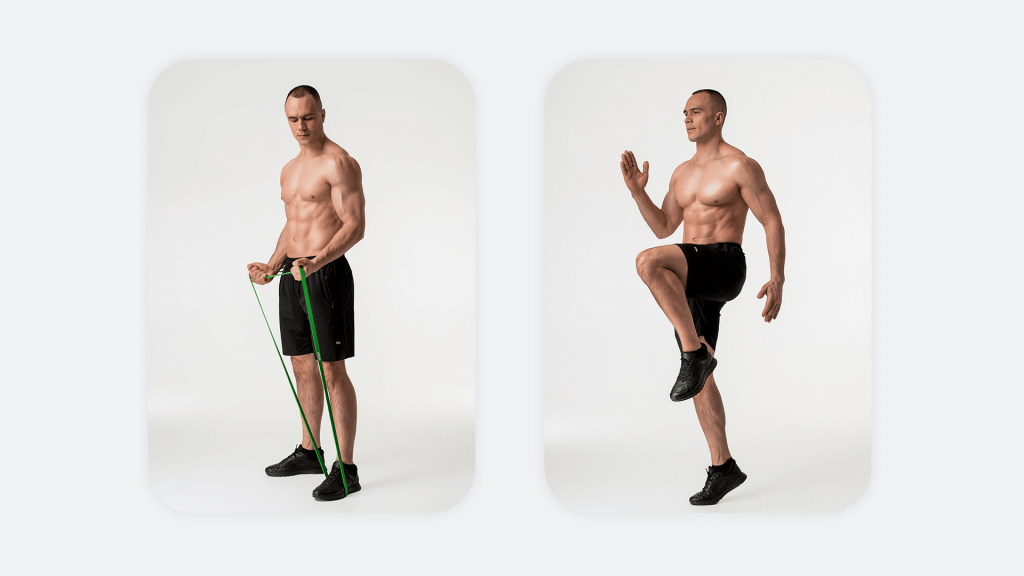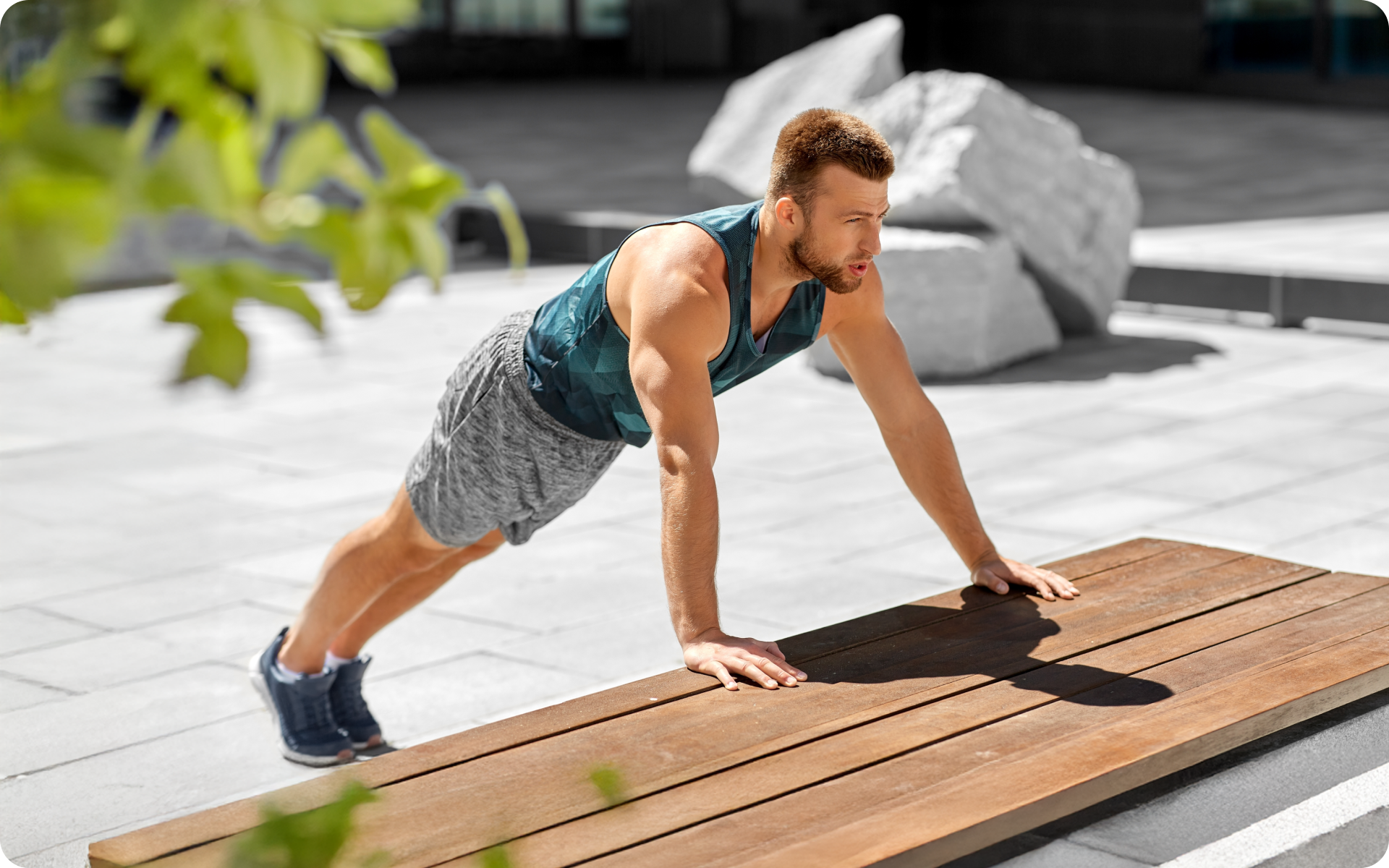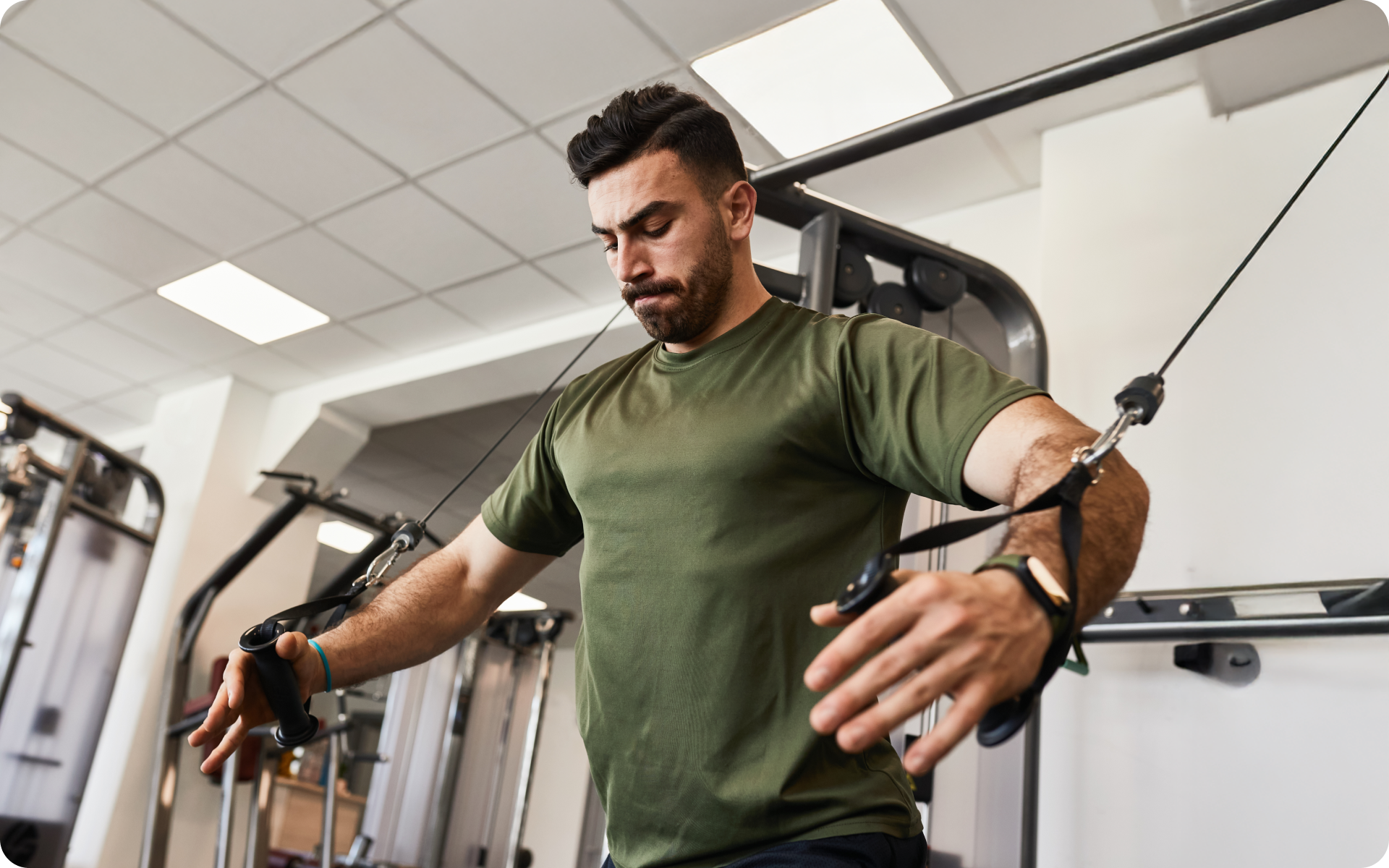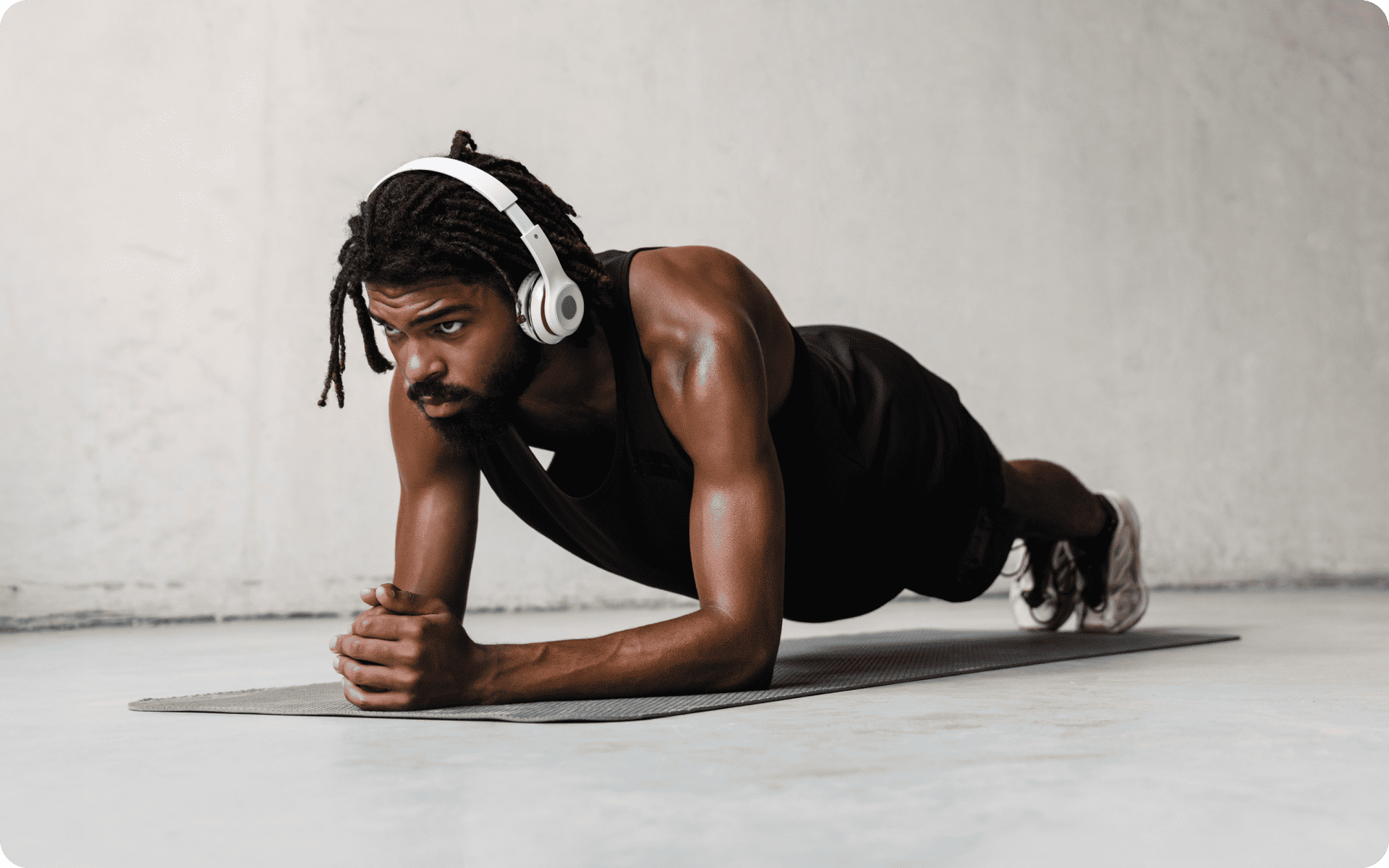Consistency is one of the most important aspects of any exercise you choose to perform. When it comes to calisthenics, a discipline that leverages gravity and body weight for resistance, this concept is even more important.
It’s not about performing an occasional intense and grueling workout, but rather adopting a daily routine that becomes as integral to your day as brushing your teeth.
The good news? Setting up a daily calisthenics routine that works doesn’t require expensive equipment or gym memberships.
We’ll guide you through the process of creating a personalized calisthenics regimen that fits seamlessly into your lifestyle, which will help you make the most of your workouts and reap the myriad benefits of this powerful form of exercise.
What Is The Best Routine for Calisthenics?
The best routine for calisthenics is a comprehensive one that targets all the major muscle groups and can be adapted to suit your fitness level. A well-rounded routine often includes the following six exercises that form the backbone of a solid calisthenics program:
Push-Ups
Push-ups are a fundamental part of any calisthenics workout at home. They primarily target the chest, shoulders, and triceps while also engaging the core and lower body to a lesser extent.
The benefits of push-ups every day include improved upper-body strength and endurance, better posture, and increased metabolic rate.
Steps to execute:
- Start in a high plank position with the hands slightly wider than shoulder-width apart
- Lower your body until your chest almost touches the floor
- Push your body back up to the starting position
- Repeat for the desired number of repetitions
Squats
Squats are a key component of a daily calisthenics routine for beginners. They primarily target the quadriceps, hamstrings, and glutes, while also engaging the core and lower back.
Steps to execute:
- Stand with feet hip-width apart, toes pointing forward
- Lower your body as if sitting back into a chair
- Push through your heels to return to the standing position
- Repeat for the desired number of repetitions
BetterMe app is a foolproof way to go from zero to a weight loss hero in a safe and sustainable way! What are you waiting for? Start transforming your body now!
Planks
Performing planks every day is an excellent way to strengthen your core. They target the entire abdominal region while also working the shoulders and back.
Steps to execute:
- Start in a forearm plank position, elbows under your shoulders and feet hip-width apart
- Maintain a straight line from head to heels
- Hold this position for the desired length of time
Pull-Ups
Pull-ups are a challenging and highly effective part of daily calisthenics training. They primarily target the back muscles, in addition to the arms and shoulders.
Steps to execute:
- Grab a bar with an overhand grip, hands slightly wider than shoulder-width apart
- Pull your body up until your chin is above the bar
- Lower yourself back down to the starting position
- Repeat for the desired number of repetitions
Jumping Jacks
Jumping jacks are a great cardio exercise to include in your daily calisthenics workout routine. They target the entire body and help improve cardiovascular fitness and coordination.
Steps to execute:
- Stand with your feet together and hands at your sides
- Jump while spreading your legs and swinging your arms overhead
- Jump back to the starting position
- Repeat for the desired number of repetitions
Lunges
Lunges are another lower-body exercise that can be included in the best daily calisthenics routine. They target the quadriceps, hamstrings, and glutes, while also engaging the core and lower back.
Steps to execute:
- Stand with feet hip-width apart
- Take a step forward with one foot and lower your body until both knees are bent at a 90-degree angle
- Push back up to the starting position
- Repeat on the opposing side for one rep
Sample Daily Calisthenics Routine for Beginners
For beginners who are stepping into the realm of calisthenics, it is important to start with a routine that is manageable and effective.
That being said, this assorted list of 7 exercises to perform every day will help you build foundational strength and endurance, which will set the stage for more advanced exercises later on.
The routine below provides a balanced mix of exercises that target different muscle groups and can be adjusted according to different needs and fitness levels.
- Warm-up: A 5-minute warm-up of light jogging on the spot and arm circles will get the blood flowing and prepare your body for the workout.
- Push-ups: Start with 10 repetitions, gradually increasing as your strength improves.
- Squats: Perform 15 repetitions. After a while, you can integrate jump squats to increase the intensity.
- Planks: Hold the plank position for 30 seconds initially, working your way up to a minute or more.
- Pull-Ups: If you cannot initially execute a full pull-up, opt for negative pull-ups or use a resistance band for support. Start with 5 repetitions.
- Jumping Jacks: Incorporate 30 seconds of jumping jacks to keep your heart rate up.
- Lunges: Complete 10 lunges on each leg.
- Cool-down: Finish your workout with a 5-minute cool-down period, involving light stretching to help your muscles recover.
Read more: Basic Calisthenics Workout: A Comprehensive Guide for Beginners.
Is It Okay To Do Calisthenics Every Day?
While it is technically possible to perform calisthenics every day, the benefit of this is dependent on several factors.
Firstly, the intensity of your workouts is important.
Calisthenics exercises can range from low-intensity movements such as walking lunges or push-ups to high-intensity movements such as plyometric jumps or muscle-ups. If you’re doing high-intensity calisthenics workouts, your body requires recovery time. Without sufficient rest, you risk overtraining, which can result in injuries, decreased performance, and other negative health effects.
Secondly, your fitness level and goals are important considerations.
If you’re new to exercising, performing calisthenics every day may be too much for your body to handle at first. It’s often better to start with a few days per week and gradually increase this as your fitness improves.
For more advanced exercisers, daily calisthenics may become a part of your regular routine. However, you should still be mindful of your body’s signals and take rest days as required.
Thirdly, workout variation is key to preventing plateaus and ensuring the balanced development of your muscles.
If you’re doing the same calisthenics exercises each day, you may not be giving your body the variety it needs to continue making progress. Mixing up your routine can help make your workouts more challenging and engaging.
Generally, it’s essential to listen to your body. If you feel excessively sore, fatigued, or notice a decrease in performance, it is probably a good idea to take a rest day. Balanced nutrition and hydration also play crucial roles in recovery and performance.
So, while daily calisthenics isn’t inherently bad, it’s important to approach it thoughtfully and consider your specific circumstances.
How Much Calisthenics Should I Do a Day?
The amount of calisthenics you should do in a day is dependent on your fitness level, goals, and workout intensity.
Beginners
If you’re new to calisthenics or exercise in general, it is recommended to start with 20 to 30 minutes of moderate-intensity exercises, three times a week (1). This can include basic movements such as squats, push-ups, lunges, and planks.
As you become stronger and build endurance, you can gradually increase the duration and frequency of your workouts.
Intermediate
Once you’re comfortable with the basics, you can progress to more challenging exercises and longer workouts. You should aim for 45 to 60 minutes of calisthenics, four to five times a week. This can also include high-intensity interval training (HIIT) sessions, where you perform exercises at maximum effort for short bursts followed by a short rest period.
Advanced
Advanced enthusiasts who are well-adapted to high-intensity workouts might do calisthenics for up to 90 minutes a day, five to six days a week. At this stage, the focus is often on mastering complex movements such as muscle-ups, front levers, and planches.
Regardless of fitness level, it is important to warm up correctly before starting your workout and to cool down afterward. This helps prepare your body for exercise while also reducing the risk of injury.
In addition, you must remember that rest and recovery are crucial parts of any fitness regimen. Even if you do calisthenics daily, you should make sure to include low-intensity or rest days to give your body adequate time to recover.
Finally, while duration and frequency are important, they shouldn’t come at the expense of form and technique. It’s better to perform fewer repetitions correctly than to perform many with poor form. Not only will this reduce your risk of injury, it will also make your workouts more effective.
Is 15 Minutes Of Calisthenics A Day Enough?
Whether 15 minutes of calisthenics a day is enough is dependent on your fitness level, goals, and workout intensity.
If you’re a beginner or your goal is simply to maintain a basic level of fitness, then yes, 15 minutes of daily calisthenics can be sufficient. This can include a routine of push-ups, squats, lunges, and planks, and will work various muscle groups while also improving your strength and endurance.
For those who have specific fitness goals such as significant weight loss, muscle gain, or mastering advanced calisthenics movements, 15 minutes each day may not be enough. These goals often require longer, more intense workouts, and possibly the addition of strength training or cardio exercises.
However, if you’re short on time, a 15-minute high-intensity interval training (HIIT) session can be incredibly effective. HIIT involves periods of intense exercise followed by short rest periods, and this can elevate your heart rate and burn calories in a short amount of time.
It should also be noted that any amount of exercise is better than none at all. If 15 minutes is all you have, it’s still beneficial to use this time for a workout rather than skipping it altogether. You can always increase the duration or intensity of your workouts later as your schedule allows.
It is important to remember that consistency is essential in fitness. It is more beneficial to do 15 minutes of exercise every day than a longer workout sporadically. In addition, make sure to warm up properly before you start your workout and cool down afterward to prevent injury.
If you struggle to even flirt with the idea of giving up your favorite foods or working out till your legs give way – BetterMe app is here to breathe a fresh perspective into the way you view the weight loss process! Check out the app and experience the fun side of fitness and dieting with BetterMe!
What Are The Benefits of Setting Up a Daily Calisthenics Routine?
Setting up a daily calisthenics routine has several benefits. The following are some of the key advantages:
Improved Strength and Endurance
- Muscle Building: Calisthenics exercises use body weight for resistance, which helps build lean muscle mass (4). Over time, this will improve your strength and make everyday tasks easier.
- Increased Endurance: Regular calisthenics workouts can enhance your muscular endurance, which will allow you to perform activities for longer periods without becoming tired (4).
Enhanced Flexibility and Balance
- Flexibility: Many calisthenics exercises involve a full range of motion, which helps improve flexibility over time (2).
- Balance: Exercises such as planks, lunges, and single-leg squats can enhance balance and stability, which reduces the risk of falls or injuries (2).
Weight Management and Cardiovascular Health
- Calorie Burning: Although calisthenics exercises primarily target the muscles, they also get your heart rate up, which helps you burn calories and potentially lose weight.
- Heart Health: Regular physical activity, which includes calisthenics, can improve your cardiovascular health by lowering blood pressure and improving heart function (3).
Convenience and Affordability
- No Equipment Required: Most calisthenics exercises require no equipment, which makes them easy to do anywhere at any time.
- Cost-Effective: As you don’t need a gym membership or expensive equipment, calisthenics is a cost-effective way of staying fit.
Mental Health Benefits
- Stress Relief: As with any form of exercise, calisthenics can help reduce stress and anxiety by improving your mood and promoting relaxation (5).
- Improved Focus: Regular exercise can also improve your cognitive function, including attention and memory (5).
Frequently Asked Questions
Is calisthenics enough To stay fit?
Yes, calisthenics can be enough to stay fit. These exercises use your body weight for resistance and can help build strength, endurance, flexibility, and balance.
However, the effectiveness of a calisthenics routine in keeping you fit is dependent on factors such as the intensity, duration, and frequency of your workouts.
How many days a week should I do calisthenics?
The number of days you should do calisthenics each week is dependent on your fitness level and goals. Beginners can start with three days a week, while more advanced enthusiasts may do calisthenics five to six days a week.
Do you need rest days from calisthenics?
Yes, rest days are essential when you’re doing calisthenics. Rest allows the muscles to repair and grow stronger. Without adequate rest, you risk overtraining, which can result in decreased performance, injuries, and other health issues.
Is calisthenics good in the long term?
Yes, calisthenics can be an excellent long-term exercise option. It is sustainable, versatile, and can be adapted to suit different fitness levels and goals. In addition, as it uses body weight for resistance, it’s less likely to cause the types of injury that can occur with heavy weightlifting.
As with any exercise regimen, continuing to challenge yourself and varying your workouts are important for preventing plateaus and maintaining progress.
Read more: Tricep Calisthenics: The Best Workouts for Arm Strength and Definition.
The Bottom Line
Setting up a daily calisthenics routine can be an effective and enjoyable way of staying fit. Calisthenics is convenient, cost-effective, and beneficial for your physical and mental health.
Whether you only have 15 minutes or a couple of hours each day, calisthenics exercises can get your heart rate up and help you achieve your fitness goals.
DISCLAIMER:
This article is intended for general informational purposes only and does not serve to address individual circumstances. It is not a substitute for professional advice or help and should not be relied on for making any kind of decision-making. Any action taken as a direct or indirect result of the information in this article is entirely at your own risk and is your sole responsibility.
BetterMe, its content staff, and its medical advisors accept no responsibility for inaccuracies, errors, misstatements, inconsistencies, or omissions and specifically disclaim any liability, loss or risk, personal, professional or otherwise, which may be incurred as a consequence, directly or indirectly, of the use and/or application of any content.
You should always seek the advice of your physician or other qualified health provider with any questions you may have regarding a medical condition or your specific situation. Never disregard professional medical advice or delay seeking it because of BetterMe content. If you suspect or think you may have a medical emergency, call your doctor.
SOURCES:
- American Heart Association Recommendations for Physical Activity in Adults and Kids (2018, heart.org)
- Are flexibility and muscle-strengthening activities associated with functional limitation? (2022, sciencedirect.com)
- Cardiorespiratory responses of healthy subjects to calisthenics performed on land versus in water (1992, pubmed.gov)
- Effect of Progressive Calisthenic Push-up Training on Muscle Strength and Thickness (2018, pubmed.gov)
- Exercise for Mental Health (2006, nih.gov)
- Exercise for Mental Health (2006, nih.gov)
